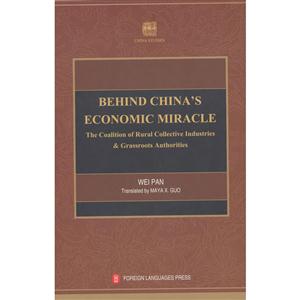-
>
中共中央在西柏坡
-
>
中国历代政治得失
-
>
中国共产党的一百年
-
>
在庆祝中国共产主义青年团成立100周年大会上的讲话
-
>
中国的民主
-
>
中华人民共和国六十年实录(套装共10册)
-
>
新书)社会主义发展简史(大字本)
农民与市场中国基层政权与乡镇企业 版权信息
- ISBN:9787119093840
- 条形码:9787119093840 ; 978-7-119-09384-0
- 装帧:一般胶版纸
- 册数:暂无
- 重量:暂无
- 所属分类:>>
农民与市场中国基层政权与乡镇企业 本书特色
《农民与市场:中国基层政权与乡镇企业(英文版)》主要包括INTRODUCTION、MARKETIZATION AND PEASANTS、LEGACIES OF SOCIALISM、ON THE ROAD TO MARKETIZATION: THE LOSERS、ON THE ROAD TO MARKETIZATION: THE WINNERS、VARIATIONS ON THE SAME THEME等内容。
农民与市场中国基层政权与乡镇企业 内容简介
本书作者以市场化为框架,以中国农村工业的兴衰史为主线索来研究当代农村。本书指出,在市场化过程中,中国基层政权承担了国家不可能承担的责任,为中国农民走向市场架起了一座精致的桥梁,扮演了市场中介的角色。在基层政权的带领下,亿万农村人以小型农村集体为单位,扶老携幼闯荡工业市场,保障了自身的安全,赢得了全世界市场对手的尊重,换取了本地社区的文明与进步,乃至全中国的稳定和繁荣。 一个地区的基层政权能否扮演农民与市场之间的中介,决定这个地区的农民在市场中的命运。农民在市场中的不同命运则决定中国社会的现状。本书提出,基层政权能否发挥市场中介作用,取决于继承回归家庭耕作之前的基层政权组织形式和集体主义精神,在于农村社区的凝聚力,也在于国内的主流意识形态。对于中国农村问题,学界有两种不同的思路。一是主流思路,视基层政权为农民贫困的原因,号召通过“转制”、“海选”、“费改税”来削弱基层政权。另一个是此书表达的思路,即视基层政权为农村社会的脊梁,认为农民、农村社区、农村基层政权三位一体,不可分割,所以号召信任、加强、和改善基层政权。 在书中,作者警告说,抽掉了基层政权这根脊梁,农民就会重新沦落成一盘散沙,变成亿万条蠕虫,积累贫困;农村社会就会退化,甚至变成不安定因素的沃土。继承在共产党领导下组织起来的传统,在基层政权的领导下组织起来,农民是千万条龙,是中国现代化列车的发动机。
农民与市场中国基层政权与乡镇企业 目录
Chapter One INTRODUCTION
Ⅰ.Rural Collectives, TVEs, and Property Rights
Ⅱ.Introducuon to Chapters
Ⅲ.Sources and Methodology
Chapter Two MARKETIZATION AND PEASANTS
Ⅰ.State—Soaety Dichotomy
Ⅱ.Grass Rural PoLiues under the Framework of Marketization
(1) The State In Marketization
(2) The Private Sector In Marketization
(3) Rural Collectives In Marketizauon
Ⅲ.Marketization and Market Intermediaries
Chapter Three LEGACIES OF SOCIALISM
Ⅰ.Rise and Fall of Commune Enterprises
(1) The Rise of Commune Enterprises
(2) The Fall of Commune Enterprises: Failure of Grain
Production
Ⅱ.The Rise of Commune and Brigade Enterprises (CBEs)
(1) Achievements
(2) Earher Explanations
Ⅲ.The Soaalist Heritage
(1) "Advantages of SociaLism"
(2) CBEs' Shared Lifeboat with Rural Large Collectives
(3) Organizational Pattern of Socialist Rural Grassroots Authorities
(4) Ⅰndustrial Collectives and Grain Production
Ⅳ.Ordeal at the Juncture
Ⅴ.Summary
Chapter Four ON THE ROAD TO MARKETIZATION: THE LOSERS
Ⅰ.Renshou Peasant Riots
(1) General Conditions
(2) National Highway 213
(3) Background
(4) "Riots"
Ⅱ.A Failed Intermediary
(1) Self—help for Individual Peasants
(2) Crippled Local Authorities In Renshou
Ⅲ.Family Farm_ing, Rural Cadres, TVEs, and Marketization
(1) Family Farming Policy
(2) Family Farming, Rural Cadres, and TVFs
(3) TVEs and Marketization
Ⅳ.Summary
Addendum Ⅰnterviews with Peasants of Xiaogang Village by Chen Chuang & Zeng Defang
Chapter Five ON THE ROAD TO MARKETIZATION: THE WINNERS
Ⅰ.Competition over Industrial Resources
(1) Procuring Capital
(2) Acquiring Technology
(3) An Eroded Planned System
(4) Commercializing Bureaucratic Resources
Ⅱ.Strength of Collective Competition
(1) A "Back—to—the—Future" Village In Jiangsu Provin.ce
(2) A "Back—to—the—Future" Village In Shanxi Province
(3) A "Back—to—the—Future" Village Ⅰn Shaanxi Province
(4) A "Back—to—the—Future" Village Ⅰn Henan Province
Ⅲ.Summary
Chapter Six VARIATIONS ON THE SAME THEME
Ⅰ.The Exceptions
(1) Wenzhou Family Workshops and Rural Grassrootsm Authoriues
(2) Pearl River Delta and Hong Kong
(3) Southern Jiangsu and Shanghai City
Ⅱ.Four Intermediary Models and Their Soaal Consequences
(1) Rural Society In Wenzhou Prefecture
(2) Rural Society In the Sichuan Basin
(3) Rural Society In the Pearl River Delta
(4) Rural Soaety In the Yangtze River Delta
Ⅲ.Shareholding Reform and Privatization In Southern Jiangsu
ⅠV.Summary
Chapter Seven THE TVE IS DEAD, LONG LIVE THE TVE!
Ⅰ."Transformation": Consequence of Policy
(1) "Transformation" as a Consequence of Policy
(2) Non—ideological Reasons for the "Transformation"
Ⅱ.How Ⅰdeology Led to Policy
(1) Losses and Debt of TVEs
(2) Leadership Motivation and Grassroots Authority Intervention
(3) "Gray" Market
(4) Cases Used to Support Privatization
Ⅲ.Long Live the TVEs
Chapter Eight CONCLUSION
Ⅰ.Politics of Marketization In Rural China
Ⅱ.Rural China In the Future
Ⅲ.Implications of the Book's Conclusions
(1) The Value of Preexisting Institutions
(2) Urban China's Transition to a Market Economy
(3) Village "Sea Elecuons" and Myths of Democracy
BIBLIOGRAPHY
农民与市场中国基层政权与乡镇企业 作者简介
Wei Pan,Professor, School of International Studies Director, Centcr for Chinese & Global Affairs Peking University. Maya Guo X.,Author & Lditor, Publishing Center Phoenix Satellite Television.
- >
有舍有得是人生
有舍有得是人生
¥17.1¥45.0 - >
龙榆生:词曲概论/大家小书
龙榆生:词曲概论/大家小书
¥13.0¥24.0 - >
月亮与六便士
月亮与六便士
¥15.1¥42.0 - >
自卑与超越
自卑与超越
¥14.7¥39.8 - >
李白与唐代文化
李白与唐代文化
¥11.3¥29.8 - >
企鹅口袋书系列·伟大的思想20:论自然选择(英汉双语)
企鹅口袋书系列·伟大的思想20:论自然选择(英汉双语)
¥6.3¥14.0 - >
史学评论
史学评论
¥23.5¥42.0 - >
我从未如此眷恋人间
我从未如此眷恋人间
¥32.4¥49.8
-
佞幸-中国宦官与中国政治
¥41.6¥58 -
中国科举文化
¥21.8¥68 -
变局:七千人大会始末
¥31.6¥68 -
温家宝谈教育
¥21.7¥69 -
寺院与官府-明清五台山的行政系统与地方社会
¥16.1¥37 -
皇帝治下的中国八品
¥13.7¥39
殖民岁月-全球通史-青少年彩图版
¥10.4¥29.8创新思维
¥37.8¥45.0



















